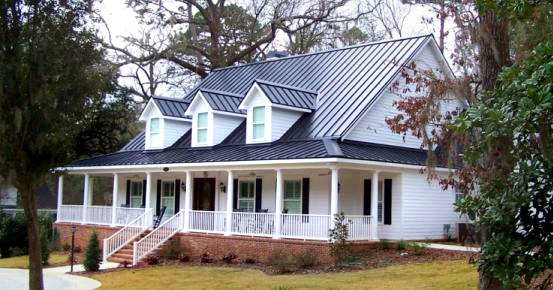
When choosing a roofing material for your home or business, it’s essential to understand the key differences between metal roofs and other common options. Each roofing material has its advantages and drawbacks, but metal roofing stands out for its durability, energy efficiency, and low maintenance requirements. In this guide, we’ll explore how metal roofs compare to traditional options like asphalt shingles, wood shakes, clay tiles, and flat roofing systems.
Metal roofs are renowned for their exceptional durability. Unlike asphalt shingles, which typically last 15 to 20 years, metal roofs can last 40 to 70 years or more with proper installation and maintenance. This longevity makes them an excellent investment for property owners who want a roofing solution that won’t need frequent replacement. Metal roofs also resist cracking, warping, and damage caused by high winds or hail, outperforming many other materials in extreme weather conditions.
Energy efficiency is another area where metal roofs excel. Their reflective surface helps reduce heat absorption, keeping indoor spaces cooler during hot months and lowering energy bills. Traditional asphalt shingles, on the other hand, tend to absorb and retain heat, which can strain your air conditioning system. For homeowners in warm climates or areas with intense sunlight, the energy-saving benefits of metal roofing can make a noticeable difference in comfort and costs.
Maintenance requirements also set metal roofs apart. While materials like wood shakes and asphalt shingles often need regular repairs or replacements due to rot, mold, or curling, metal roofs require minimal upkeep. They are resistant to pests, mildew, and fire, and their panels are designed to shed rain and snow easily. This low-maintenance aspect is particularly appealing to property owners who want to minimize long-term roofing expenses.
In terms of aesthetics, metal roofs offer a wide range of styles and finishes, making them suitable for both contemporary and traditional designs. Homeowners can choose from sleek standing seam panels, metal shingles that mimic slate or tile, and even corrugated panels for a rustic look. While asphalt shingles are limited in terms of customization, they remain a popular choice for their affordability and ease of installation. Clay tiles and wood shakes, though visually striking, often come with higher maintenance needs and a shorter lifespan compared to metal roofs.
Cost is often a deciding factor when selecting roofing materials. Metal roofs typically have a higher upfront cost than asphalt shingles, but their long lifespan and energy efficiency make them more cost-effective over time. Asphalt shingles are more budget-friendly initially, but frequent repairs and replacements can add up. Clay tiles and wood shakes are often priced similarly to metal roofing but lack its durability and weather resistance.
For commercial properties, the choice between metal roofs and flat roofing systems depends on specific needs. Flat roofs, commonly made from rubber membranes or modified bitumen, are affordable and easy to install but require regular maintenance to prevent leaks and ponding water. Metal roofs, on the other hand, provide a long-lasting and low-maintenance solution for businesses seeking durability and energy efficiency.
Weather resistance is another critical difference between metal roofs and other materials. Metal roofing panels are interlocked and securely fastened, offering superior protection against high winds, heavy rain, and hail. Asphalt shingles can be torn off during storms, while wood shakes and clay tiles may crack or break under severe conditions. This makes metal roofs a reliable choice for areas prone to extreme weather or natural disasters.
When it comes to sustainability, metal roofing is one of the most eco-friendly options available. Many metal roofs are made from recycled materials and are fully recyclable at the end of their lifespan. In contrast, asphalt shingles contribute significantly to landfill waste, and materials like wood shakes may require frequent replacement, increasing their environmental impact.
Ultimately, the choice between metal roofs and other materials depends on your priorities. If you value longevity, energy efficiency, and low maintenance, metal roofing is hard to beat. For those with a smaller budget or specific aesthetic preferences, asphalt shingles or clay tiles may be a better fit. However, when considering long-term costs, durability, and overall performance, metal roofing often provides the best value.
Understanding the differences between roofing materials ensures you make an informed decision that aligns with your needs and budget. If you’re considering a new roof, consult with a professional roofing contractor to explore your options and determine the best solution for your property. Whether you choose metal roofing or another material, a quality installation will ensure lasting protection and peace of mind.